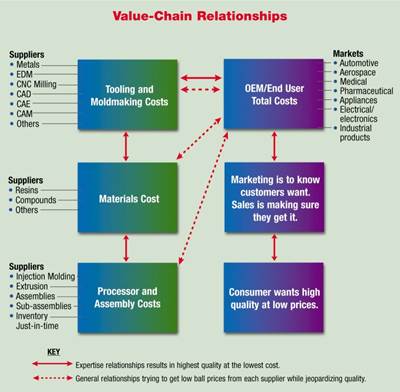I-S-O: What Is It and Is It Important to Your Business?
The first question you need to ask yourself is, what is it worth to you compared to the cost?
Do you really need ISO certification to do business with large companies? What certifications are important and what's involved in obtaining and maintaining them? For those of you more familiar with this term, please bear with me for a moment while I give a quick history lesson. The ISO is an organization of the national standards institutes of 157 countries. However, when you hear the term ISO, it often refers to ISO certification, which is a system of guidelines that the ISO created to promote standards for quality. The guidelines are numbered, but the most common one in manufacturing is ISO 9001, which is part of the ISO 9000 family.
In manufacturing, some of the requirements of ISO 9001 include procedures that cover business processes; monitoring the processes to ensure quality; keeping proper records; checking outgoing products for defects; and regularly reviewing the processes for effectiveness. Sounds like a lot of work, and it is, so the question becomes do you need this certification?
The first question you need to ask yourself is, what is it worth to you compared to the cost? If you had this certification, what business would it get you? Of your current and targeted customers, how many of them require that you have it to do business with them? If you decide against it, how many customers would you lose versus the cost of certification to keep them?
Once you weigh the cost factors, there are several ways to go about obtaining the certification. The first and most important step is to know what you want to get out of the certification process. If you don’t have your own internal handbook on quality, and you should, this would be a great time to develop it and match it against your expectations for the certification process.
Another good early step is to talk to your local association or colleagues that have gone through it and hear about their experiences. When it comes to selecting a certification body to work with, is one registrar better than any other? And do you have to use the same one that your customer uses?
The next step depends on your commitment to the project. If you are looking to dive deep into the process, look for a certification organization. Choose one that is most aligned with your business goals, talk with the management and make sure they have worked with companies of your size and type before. However, if you are looking at “just securing the certification,” there are literally thousands of consultants who either specialize in or have developed programs to help you become ISO certified. They have worked with the ISO and other certification bodies to become trained and they sell that training and knowledge to you. The prices vary based on the size of your shop, but the important cost to remember is not the initial investment, but the ongoing training and costs expended every year.
In the MFG.com marketplace, around 25 percent of the suppliers have some type of ISO certification. So to that 25 percent it was worth their time and money, but that also means that 75 percent of the suppliers on MFG.com are not certified (at least not officially) and are still doing well in their business. That number is also supported by the fact that with more than 100,000 RFQs sourced on MFG.com, a small percentage of those jobs have required companies to be ISO certified, and most of those jobs are for much larger companies, or those that have specific industry needs (aerospace, automotive, etc.).
By itself, a piece of paper saying that you are certified will not improve your business. The standards should be put in place as a long-term strategy to improve your processes and your customer’s experience and relationship with you.
In summary, there are two instances when I would strongly recommend ISO certification. First, if you are being told by current customers that you must be certified and these were customers that you could not survive without. And secondly, if it would allow you to increase sales and command a premium price for your product to cover the overhead.
Related Content
Tackling a Mold Designer Shortage
Survey findings reveal a shortage of skilled mold designers and engineers in the moldmaking community, calling for intervention through educational programs and exploration of training alternatives while seeking input from those who have addressed the issue successfully.
Read MoreMMT Chats: Solving Schedule and Capacity Challenges With ERP
For this MMT Chat, my guests hail from Omega Tool of Menomonee Falls, Wisconsin, who share their journey with using enterprise resource planning (ERP)—and their people—to solve their schedule and capacity load monitoring challenges.
Read MoreHow to Improve Your Current Efficiency Rate
An alternative approach to taking on more EDM-intensive work when technology and personnel investment is not an option.
Read MoreMaking Quick and Easy Kaizen Work for Your Shop
Within each person is unlimited creative potential to improve shop operations.
Read MoreRead Next
Are You Ready for ISO Certification?
ISO certification just may give you the competitive edge that you need to survive in this economy.
Read MoreHow to Use Strategic Planning Tools, Data to Manage the Human Side of Business
Q&A with Marion Wells, MMT EAB member and founder of Human Asset Management.
Read MoreAre You a Moldmaker Considering 3D Printing? Consider the 3D Printing Workshop at NPE2024
Presentations will cover 3D printing for mold tooling, material innovation, product development, bridge production and full-scale, high-volume additive manufacturing.
Read More
















